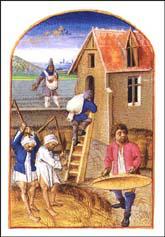William of Jumieges
William of Jumieges was born in Normandy in about 1025. He became a Benedictine monk at Jumieges. In about 1070 he compiled a history of the Norman rulers, The Deeds of the Dukes of Normandy. The book started with the story of Rollo the Ganger and ended with William the Conqueror. The book was based on William's reading of existing manuscripts plus his own knowledge and observations.
When William finished the book he sent a copy to William the Conqueror. He also sent a letter which explained that the main purpose of the book was to demonstrate that William was the rightful king of England. William of Jumieges died in about 1090.

Primary Sources
(1) William of Jumieges, Deeds of the Dukes of the Normans (c. 1070)
Edward, king of the English, lacking an heir sent Duke Harold, the greatest of all the earls to swear fealty to William, Duke of Normandy concerning Edward's crown. Harold remained with the duke for some time, and swore fealty concerning the kingdom with many oaths, before being sent back to the king laden with gifts.
(2) William of Jumieges, Deeds of the Dukes of the Normans (c. 1070)
William, Duke of Normandy, never allowed himself to be deterred from any enterprise because of the labour it entailed. He was strong in body and tall in stature. He was moderate in drinking, for he deplored drunkenness in all men. In speech he was fluent and persuasive, being skilled at all times in making clear his will. He followed the Christian discipline in which he had been brought up from childhood, and whenever his health permitted he regularly attended Christian worship each morning and at the celebration of mass.
(3) William of Jumieges, Deeds of the Dukes of the Normans (c. 1070)
The peasants wanted to make use of the woods, forests and waters. Each assembly of English people appointed two deputies who were to meet in order to press their case. But William, Duke of Normandy, learning of this, promptly sent a group of soldiers to scatter the peasant gathering. They arrested all the deputies and some other peasants, having first chopped off their hands and feet, they sent them back home to their families, helpless for the rest of their lives.
